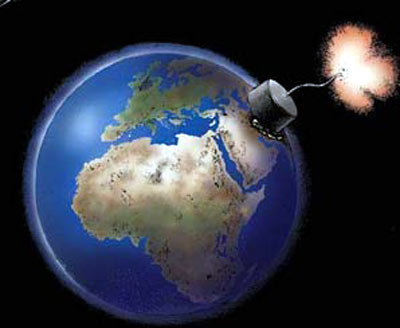
WASHINGTON -- We might as well say it: The world is a mess, and a mess that could seriously influence the future of the United States.
WHAT:
This week, the Saudis started bombing Yemen and threatened to soon come in by foot across the daunting mountains that separate the Sunni Saudis from the Shiite Yemenis. It must be noted that this is not something new for the Yemenis, for they have been at war -- mostly with themselves -- for centuries.
Up north in Iraq, you need a constantly evolving program to identify the players. But let's just agree that, in general, the Iranians have sent their most mean-spirited troops, those of the Quds brigade, under their meanest general to support the put-upon Shiites in Iraq. A restored Iraqi Sunni government military is supposed to fight alongside them, but there is considerable confusion about this.
The intention is to degrade, destroy and demolish the heinous ISIS or Islamic State of mainly pathological killers from around the world and teenaged boys from the West who haven't found enough excitement at home. But all of this is confusing to the U.S., which thought it was building a unified Islamic state of Sunnis and Shiites and Kurds in Iraq and ended up with Dante's lower levels of Hell.
Saddam's Iraq -- he ruled roughly from 1973 to 2003 -- was one of the cruelest and most evil states in history, but it also served, in a Middle East that has been the poisoned heart of endless killing among clans, tribes and religions, as a kind of rock in the center of that upheaval, which has kept peoples and governments in the region in relative stasis.
But when the U.S., expecting to be welcomed with flowers, invaded Iraq in 2003 to establish a democracy and leave in six months, something else happened.
WHY:
The designers of the patently unwise invasion by the Yanks of what was once Mesopotamia seemed to have no idea whatsoever of this role played by Iraq. And yet, Washington had supported Iraq throughout the 1980s in its war with Iran when the Shiite clergy came to power there. What the two sides were really fighting for -- a geopolitical balance of players and fighters in the Middle East -- escaped the American players completely.
Once the Americans left early in the Obama presidency, and Iraq virtually collapsed under the futility of a Shiite presidency that did not include the Sunnis in governance, massacring groups like the Islamic State formed to defend the Sunnis, illustrating the lengths to which socially and psychologically untethered young men in the region and elsewhere would go to escape their aimlessness.
From there, an all-out Sunni-Shiite war began, spreading across the entire Middle East, with Egypt now attacking Libya, with Syria serving as the center of operations, and even with Nigerian militias attacking Niger and Cameroon.
WHENCE:
To question what comes next offers a great extravagance of possibilities and a few dark probabilities.
The entire region could collapse into intra-religious and even inter-group rivalry and killing. This area, where three great religions were founded and civilization grew from Abraham walking down from the great city of Ur to spread his wisdom across the Middle East, Europe and eventually America, could now witness the death of civilization. The Islamic State has already been systematically destroying the precious artifacts of humanity from Hatra to Nineveh to Mosul.
There is, of course, the possibility that somehow, somewhere, sometime, the region could coagulate again -- that the two major arms of Islam could negotiate, or mediate, or come together in some kind of agreement. But at this time, it is difficult to see how this could happen.
One possibility for hope is the fact that the Arab states said recently they had agreed to form a combined military force -- but it is meant to counter not only Islamist radicalism but also Iranian influence. This has good possibilities, although it could also mean all-out war between the Arab and the Iranian strains of Islam.
The best thing said upon the announcement of a combined military force is that analysts see it as a vehicle to deal with the increasingly hated American influence in the region. Indeed, it is Washington's intervention that most analysts agree was the catalyst, whether in the 1980s in support of the anti-Soviet mujahedeen in Afghanistan or in the invasion of Iraq, for changing the map of the Middle East.
America is a continent born blessed, protected by the arms of two great oceans, with vast open spaces and towering mountain ranges. We have no need to travel across the seas to invade other countries or to destroy other civilizations. And yet that is what we have been doing in the Near East.
The single most important thing to look to in our next president is a man or woman who loves to stay at home and who will use our strength and forces to help build a better world and not to destroy ever more thoughtlessly the world we have.
Previously:
• 03/04/15: Japan's sun poised to rise on world stage
• 01/21/15: Rumors of a new Cold War have real roots in history
• 01/21/15: It's time to be practical about multiculturalism
• 01/07/15: Tension mounts against Muslim immigration in the West
Comment by clicking here.
Georgie Anne Geyer has been a foreign correspondent and commentator on international affairs for more than 40 years.



 Contact The Editor
Contact The Editor
 Articles By This Author
Articles By This Author